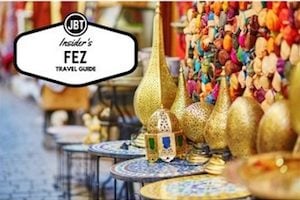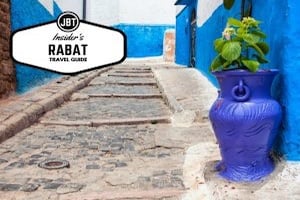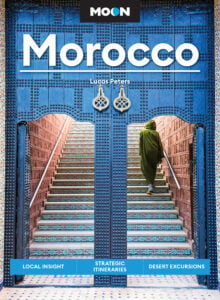 “Never act in haste. Think first.” Those are the words of a storyteller who sells his words for 100 pieces of gold per portion to the Sultan of Marrakesh in Abderrahim El Makkouri’s story, “The Vizier and the Barber.” These words end up saving the Sultan’s life. If it were not for the work of Richard Hamilton, we would not know Makkouri’s story today.
“Never act in haste. Think first.” Those are the words of a storyteller who sells his words for 100 pieces of gold per portion to the Sultan of Marrakesh in Abderrahim El Makkouri’s story, “The Vizier and the Barber.” These words end up saving the Sultan’s life. If it were not for the work of Richard Hamilton, we would not know Makkouri’s story today.
In 2006, Richard Hamilton was sent to Marrakesh as a correspondent for the BBC. Shortly after arriving, he heard of the hlaykia – oral storytellers – who had been plying their trade in Marrakesh for nearly 1,000 years. He was intrigued by the possibility that people in Morocco, where the literacy rate hovers around fifty percent, still practiced the dying art of oral storytelling. Hamilton interviewed one of these storytellers and, over the following three years, continued traveling to Marrakesh to track down more hlaykia. While interviewing them, Hamilton learns about the history of oral storytelling in Marrakesh, how the art of oral storytelling is becoming lost, and, perhaps most importantly, he recorded these stories that had previously only been told in small circles in the Jemma el Fna, the main square and carnival heart of Marrakesh, for a millennium.
 “When I first arrived in Marrakesh,” Hamilton writes, “it felt more like 1006; it seemed to be somewhere that had not changed for a thousand years.” Such is the feeling one can have from arriving in one of the oldest cities in Morocco where the famed pink mud walls of the medieval city reflect the setting of the sweltering sun. Hamilton notes the “strange cast of characters” that swarm the Jemma el Fna at night. “There are rich and poor, merchants and mad men, beggars and thieves, travelers and tarts, hustlers and holy men, dark-eyed beauties and disfigured cripples, and they all swirl around the giant plug hole that is the main square of Marrakesh.” In the “giant plug hole” of the Jemma el Fna, Hamilton introduces us to a few of the hlaykia he has met in his years researching this book.
“When I first arrived in Marrakesh,” Hamilton writes, “it felt more like 1006; it seemed to be somewhere that had not changed for a thousand years.” Such is the feeling one can have from arriving in one of the oldest cities in Morocco where the famed pink mud walls of the medieval city reflect the setting of the sweltering sun. Hamilton notes the “strange cast of characters” that swarm the Jemma el Fna at night. “There are rich and poor, merchants and mad men, beggars and thieves, travelers and tarts, hustlers and holy men, dark-eyed beauties and disfigured cripples, and they all swirl around the giant plug hole that is the main square of Marrakesh.” In the “giant plug hole” of the Jemma el Fna, Hamilton introduces us to a few of the hlaykia he has met in his years researching this book.
Moulay Mohamed El Jabri, Abderrahim El Makkouri, Ahmed Temiicha, Mohamed Bariz, and Mustapha Khal Layoun are all storytellers from Marrakesh and it is the words of these five hlaykia, translated from Darija (Moroccan Arabic), that comprise the vast majority of The Last Storytellers.
The stories in this collection read much like Grimm’s Fairy Tales. There is murder, mystery, magic and mayhem, evil stepmothers and fairy godmothers, mean hunchbacks and cruel lords, clever princesses and brave princes, sultans, treasures, happy endings and moral lessons. These are the types of stories that have been feeding our imagination, entertaining us and teaching us for thousands of years. “Like Aesop’s fables,” Hamilton writes, “almost all Moroccan stories are essentially morality tales.”
Some of these tales – like “Aicha Rmala,” a Moroccan version of Cinderella – will seem very familiar, and provide a good starting point for understanding another facet of the incredibly complex culture of Morocco. But these stories also serve to show how similar cultures truly are. In his introduction, Hamilton continually draws on the lessons of Joseph Campbell, that perhaps there is one great ‘monomyth’ that is told across borders, cultures and languages. After all, though most people know the story of Cinderella, most people probably do not know that there over 350 versions of this story that have been told and recorded worldwide, the first being in China around 850 A.D. Throughout the reading of these stories from the Jemma el Fna in Marrakesh, one cannot help but be transported back into the childish glee that is reveling in the art of story.
“Aicha Rmala” begins, like many of these tales, with just enough information for the story peek the curiosity of the audience.
“A man married two women; one, Khadija, was kind and beautiful, but the other, Zohra, was wicked and ugly. He did not know it, but his second wife was a sorceress, you see.”
Like that, we are transported to the familiar, yet strange, world of fairy godmothers and evil sorceresses. The ending of “Aicha Rmala,” like its beginning, is strikingly different from what you might expect. It ends with… Well, I don’t want to spoil the ending. You will have to read it for yourself. Much of the charm of these stories, after all, is figuring out just how the ending will be happy, how the princess will outwit the evil stepmom, and how everyone will live happily ever after – except the bad guys, of course!
Richard Hamilton has collected many of these tales in the hope that they will live on even if the art of the hlaykia dies out, which is very likely. For those traveling to Morocco and those interested in the art of storytelling, this collection of tales provides for some fascinating reading. And maybe, like the Sultan of Marrakesh, you will tell yourself that you bought these words “very cheaply” because you had learned a moral that saved not only your life, but the life of these stories.
[stextbox id=”info” caption=”Win a Signed Copy!”]
Win a signed copy of The Last Storytellers. All you have to do is visit us on Facebook and leave a comment on the thread about the book. Winner selected randomly on 5 January 2013.
[/stextbox]
 Researched and written by Lucas M. Peters, who has been living in and exploring the hidden gems of Morocco for a long time. He teaches English at Al Akhawayn University and is pursuing an MFA at Goddard College. You can follow him on Twitter @LucasMPeters.
Researched and written by Lucas M. Peters, who has been living in and exploring the hidden gems of Morocco for a long time. He teaches English at Al Akhawayn University and is pursuing an MFA at Goddard College. You can follow him on Twitter @LucasMPeters.









I rely look forward reading this book. My life took a unexpected turn last year when I met members of a large berber family, and became close friends. We travel several times a year in Marocco, and during our long hours in the car I’m being told tales they have been told in there family and tribe for generations. It reminds me of the tales I heard as a child, growing up in the Faroe Islands. Tales that goes more than a thousand years back, and still are very much alive on the islands due to a strong tradition of singing in the form of ‘skaldekvad’ (skaldic poetry).
For those of us with a fascination of Morocco–well deserved because it is an intriguing place–this book sounds like a must-have for one’s library, a book that would never sit long on the shelf. Stories, by their nature, are meant to be shared. Just the snippet in this review is enough to whet one’s appetite.
I HAVE BEEN TO MOROCCO TWICE AND PLAN TO RETURN IN A YEAR OR SO, BUT IN THE MEANTIME THIS BOOK WOULD MAKE SHORT THE DISTANCE IN TIME AND SPACE. GO THERE AND YOU TOO WILL RETURN.